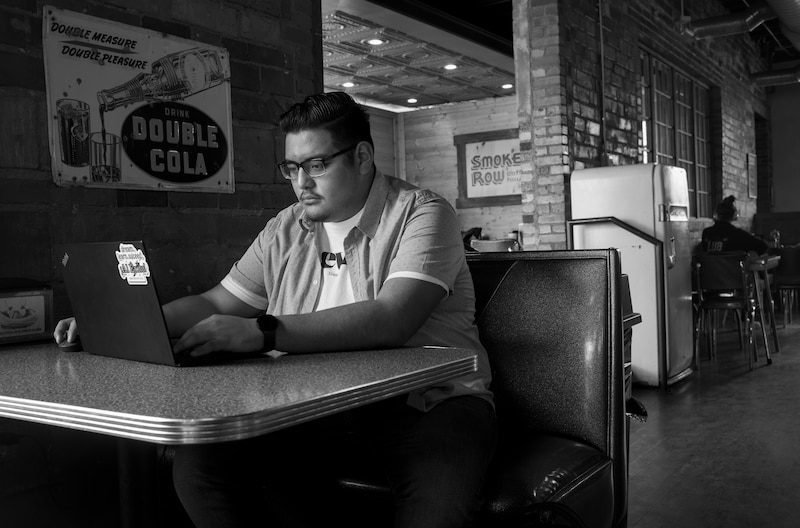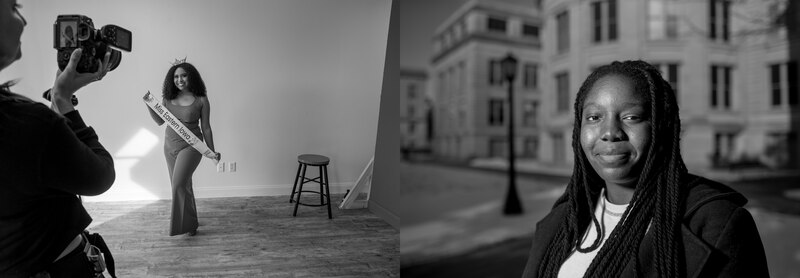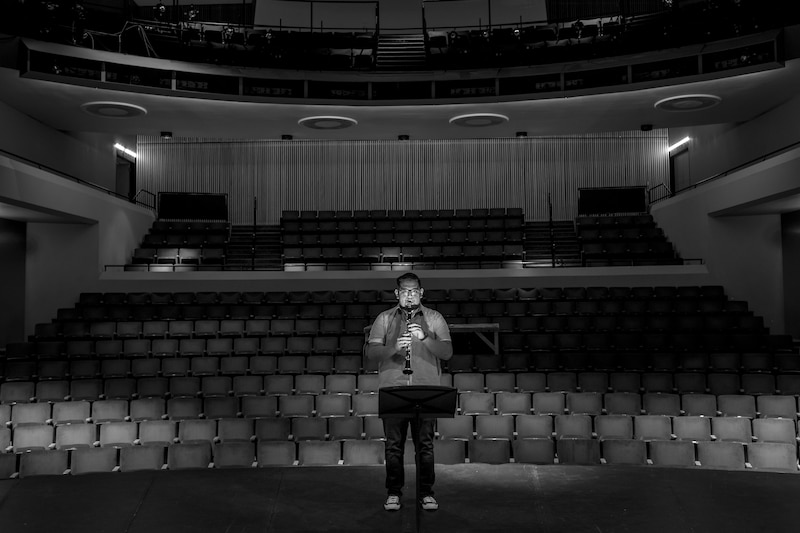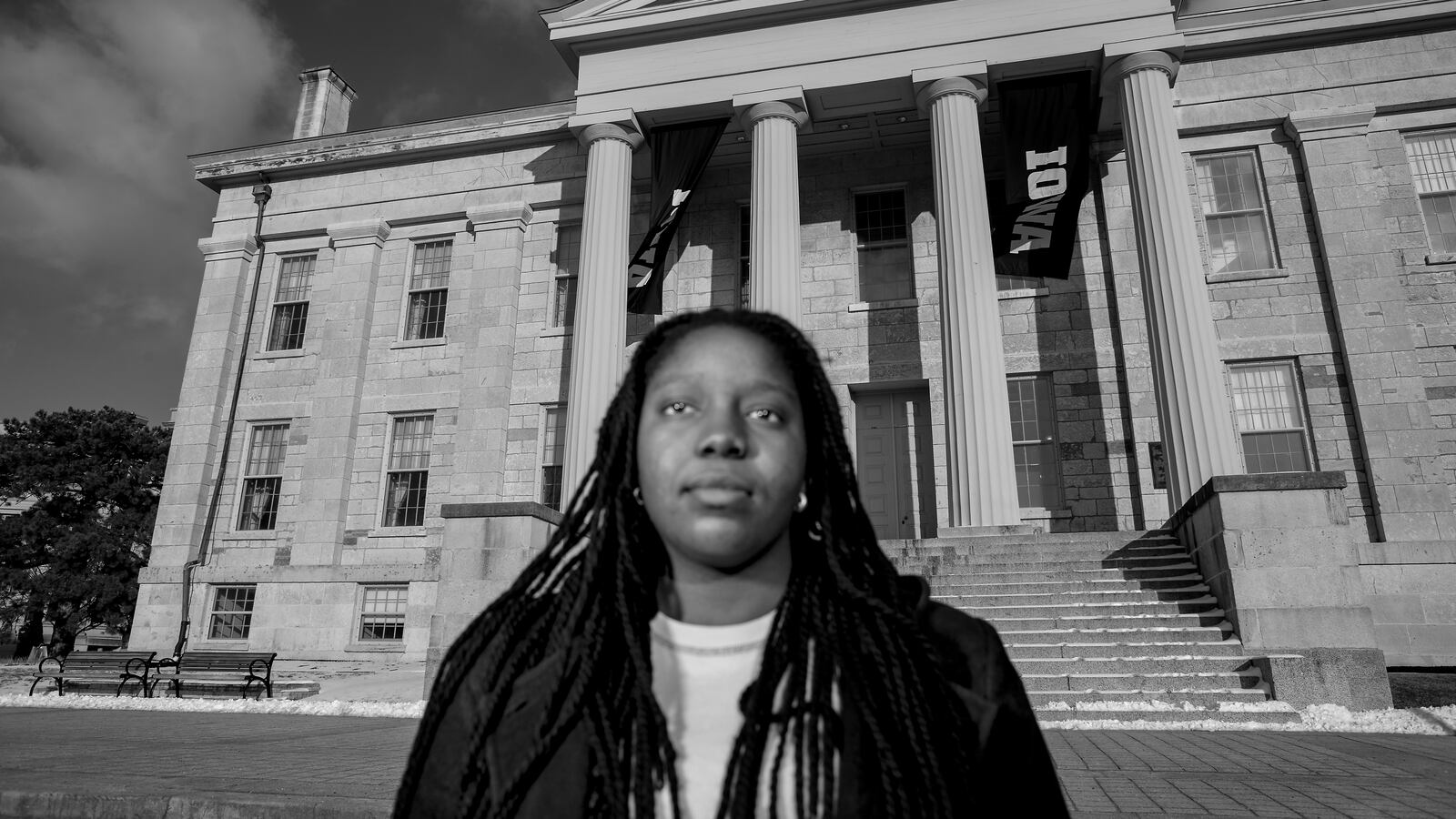This story was co-published with The Washington Post.
Volta Adovor has a lot she wants Iowa’s teachers to know.
To start: Some kinds of hands-on learning can feel inappropriate, not illuminating. A lesson about the tight quarters Africans were packed into during the global slave trade doesn’t require students to lie down side by side on the floor, as Adovor was asked to do in 10th grade.
Being singled out can be hard, too. “If we’re watching a video of a Black man getting hung, which is something that did happen when I was in eighth grade, the teacher then should not ask me: ‘Oh, do you feel comfortable?’” Adovor said. Checking in with a student after class, or sending an email in advance, might work better.
Those are a few of the ideas Adovor and two other high school students included in a presentation they crafted last spring. Called “What We Need Our Teachers to Know About Race,” it was to be part of a conference put on by Iowa’s state education department in April 2021 focused on equity in education. More than 650 educators had registered to attend.
But a few weeks before it was scheduled to take place, the conference was postponed. A bill that would limit how teachers can talk about racism was making its way through the state legislature, and state education officials said they were “mindful” that the bill could affect the conference.
“I was pretty mad,” said Adovor, who’s now 18 and a freshman at the University of Iowa. “It just felt like our voices were being silenced.”
The bill became law in June. It bans state agencies and schools from teaching “divisive concepts” at mandatory training sessions, including the idea that the U.S. or the state of Iowa is systemically racist or sexist, though it doesn’t apply to optional events like the state conference.
Still, the department hasn’t rescheduled the event, and officials have removed more than a dozen related videos posted in the run-up to the conference. One was a workshop about how schools could better listen to student voices. (The conference “is one option that we continue to consider,” department spokesperson Heather Doe said in an email.)
The deferred conference stands as just one illustration of the nation’s about-face on centering race and equity in teachers’ work over the last year. For the students, though, the fallout has been both local and personal. After state officials asked them to share their time and experiences as students of color, the apparently open-ended postponement has left some feeling doubly dismissed.

“We wanted to give solutions,” Adovor said. “It was just us talking about things that we cared about.”
Iowa education officials announced plans to host trainings centered on social justice and education equity in July 2020, about two months after the murder of George Floyd.
At the time, school districts and education organizations across the country were promising to better serve their students and families of color and acknowledging how they’d fallen short. A Virginia school district apologized for the role it had played in racially segregating its students. A Chicago charter school network disavowed a disciplinary practice it described as “white supremacist and anti-black.” Advocates successfully lobbied cities like Minneapolis, Oakland, Denver, and Seattle to reduce the presence of police officers in their schools, pointing to the disproportionate share of Black students who are arrested at school.
It was in that climate that Iowa’s education department started its many months of work on an event where educators, school leaders, and state education officials could “engage on issues that impact educational opportunities for historically disadvantaged/marginalized students,” as a program draft put it.
As more schools have undertaken equity and inclusion training for staff, some educators and parents have complained about what they see as heavy-handed and divisive tactics, like putting teachers into groups based on their race or asking white people to acknowledge their inherent privilege.
This conference bore little resemblance to that. Several sessions appeared to offer introductory information, such as “Equity Challenges and Solutions for Iowa’s English Learners” and “What is new since 1492 - An Overview of the American Indian Experience.” Others offered practical how-tos for teachers and school leaders looking to make their curriculum more inclusive or adjust school policies.

Notably, students were set to play a prominent role. In his conference presentation, Orlando Fuentes, now 19, was going to share the results of a survey he’d participated in that found dozens of Latinx students in Iowa reported they’d been called racial slurs or had racist jokes made about them at school.
Mariah Martinez, now 20, wanted to push educators in her home state to better incorporate the contributions of Black Americans, after her own history lessons as an Iowa student focused on “slavery, and Jim Crow, and hangings.”
“For the first time in five years, I felt like we were really moving forward and ‘doing’ equity work and not just ‘saying’ we are doing it,” wrote April Pforts, an Iowa education department official, in a letter that Chalkbeat obtained through an open records request.

Iowa would then become a part of another national trend. Over the last year, Iowa and 13 other states have passed laws or other policies that restrict how teachers can talk about racism and sexism at school, according to Education Week. Dozens more states have considered similar proposals.
Iowa House lawmakers passed an initial version of their legislation in March 2021, about a month before the scheduled equity conference.
The legislation’s main backer, Iowa House Rep. Steven Holt, said the proposal would ensure that schools don’t unfairly portray whole groups of people as inherently racist or sexist, and that concepts like white privilege are taught as part of more in-depth lessons. He and his wife, an Iowa public school teacher who was temporarily put on leave in 2019 for using an anti-Black racial slur in class, valued “academic freedom,” he said.
“This does not in any way ban diversity training or racial sensitivity training,” he said in a speech from the Iowa House floor last March. The bill, he added: “specifically allows training that promotes racial, cultural, ethnic, and intellectual diversity and inclusiveness.”
He reiterated that in a statement to Chalkbeat about the conference.
“Either those involved in the cancellation had not taken the time to understand the provisions of the bill,” Holt wrote in an email, “or in fact they intended to teach the divisive concepts identified in the bill that scapegoat and stereotype entire classes of people, in which case canceling the conference was appropriate.”
Here, as elsewhere, though, the effects would stretch beyond the text of the legislation.
Within a week, state education officials were scrambling to call off the equity conference and explain to confused educators why all the related materials had disappeared, emails obtained by Chalkbeat show.
“I think we need some sort of a blanket message to respond,” Jeanette Thomas, one of the lead conference organizers, wrote to several high-ranking education department officials. “This is my third message in about 15 minutes. Help!!” When Thomas received little guidance, she reiterated her concern: “Rather than delete the emails, I was hoping we could have one response to use.”
Some education department officials were clearly upset. The day the department pulled the plug, one of the lead organizers, Isbelia Arzola, summed up her feelings in a chat with a coworker. “It is very sad and disappointing,” she wrote. “I couldn’t sleep last night.”
After her colleague closed the conference registration, Arzola replied: “Thanks, I am crying again…”
In a phone call, panelists were told the conference was being postponed until the fall. “We were mindful of the presenters’ time in making this decision because we did not want to move forward with sharing content without knowing whether or not it would be compliant with the final bill language,” Doe, the education department spokesperson, told Chalkbeat in an email.
Iowa Gov. Kim Reynolds, who has risen to prominence within the Republican party, signed the bill in June, saying she was “proud to have worked with the legislature to promote learning, not discriminatory indoctrination.”
In the months that followed, Iowa teachers would report curtailing classroom discussions about topics like genocide, sexism, and the “one-drop” rule in response to the new law. The education department co-hosted a conference about emotional and behavioral health in November. There was still no word on the equity conference.
“No one contacted me at all,” Adovor said. “That’s how I knew it wasn’t going to happen.”


The experience left students feeling frustrated or disheartened. They’d accepted invitations to headline sessions because they knew their experiences could offer lessons for Iowa educators.
Martinez, for example, was going to draw on her experience as a young Black and Mexican woman who attended a predominantly white Iowa school. She wanted to explain what it felt like to learn only a limited slice of Black history and to have classmates who expected her to speak on behalf of all Black Americans.
“I had very supportive teachers,” she said. Still, “I never really received any positive stories about Black history until I went and sought after it myself,” Martinez said.
Fuentes had wanted to make his pitch for why schools should prioritize hiring a more diverse teaching staff and offering more culturally responsive teacher training.
As a middle schooler, he remembers being challenged and encouraged by a Latina teacher who led his Spanish class for students who’d already been exposed to the language at home. But when a white teacher who wasn’t a native speaker took over the following year, “the teaching was night and day,” Fuentes recalled.
When he asked for more difficult assignments, Fuentes was told he was being ungrateful and disrespectful. “To be received that way when I asked to be pushed educationally, it infuriated me,” Fuentes said. He stopped taking Spanish classes after that, fearful of repeating that experience.
“That’s why I was so strong about having representation in our schools,” he said. “It’s so important, so things like that don’t happen to our students.”
Kalyn Belsha is a national reporter based in Chicago. Contact her at kbelsha@chalkbeat.org.


